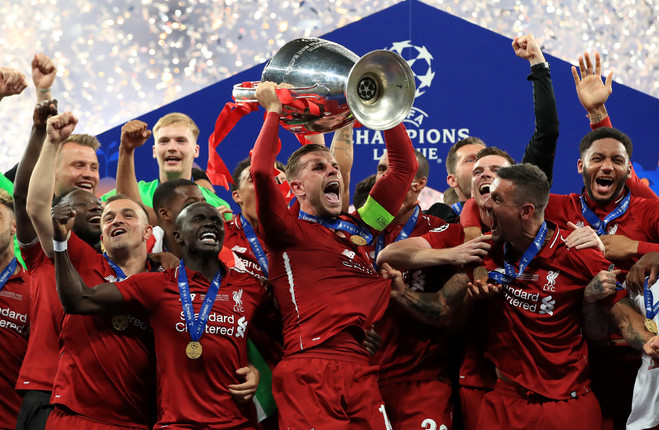1. “It was just before Christmas in 2013 when Brian Henderson, a retired police officer from Washington, Tyne and Wear, went to have a cyst removed from his neck only to be told it was cancer and that there was no guarantee, as there never is with that cruel, indiscriminate disease, that he would see it off. At first he did not want to tell his son, Jordan, because he was worried about how it might affect the performances of a player, then 23, who was already finding it hard enough to prove he was worthy of succeeding Steven Gerrard at Liverpool.”
An emotional embrace between Liverpool captain Jordan Henderson and his father, Brian, was one of the enduring images from the Reds’ Champions League final win. Daniel Taylor tells the Hendersons’ story in the Guardian.
2. “In July 2017, Tonosa arrived on these shores with the intention of running a couple of races, at the Morton Games and Cork City Sports, and returning home. Paying his own airfare and being left with just a quarter of the €800 prize money due to him by an agent was the latest challenge in his career. He had just recovered from calf and Achilles problems which had sidelined him for six months after being flogged with road races by his club in Japan. After that negative experience, he returned to Ethiopia. This time, it was not an option.”
The Irish Sun’s Neil O’Riordan meets Hiko Tonosa, the Irish national 10k champion, to learn about his life in Direct Provision and his 2020 Olympic dream.
3. ”One Ohio winter’s night, somebody stuck four sticks of dynamite in the front wheel well of Don Elbaum’s ‘67 Pontiac in the car park of the Highlander Motor Inn in Warrensville Heights. As the police sifted through the wreckage from the explosion, a detective started to ask Elbaum the type of questions usually posed to a person who’d just avoided assassination. Was there anybody he owed money too? Did he know of a particular individual with a reason to want him dead? Perhaps he could name possible suspects? The boxing promoter looked at the cop, smiled and said, “You’re going to need a bigger notebook.””
As Don Elbaum is inducted into the International Boxing Hall of Fame, Dave Hannigan’s Irish Times column looks back on the legendary promoter’s life and legacy.
4. ”The synergy between player and city cut still deeper. Naples exists on a faultline and in the shadow of a volcano, in close proximity to the cults of death and after-life, replete with what northern Europeans and Protestants call superstition. “You don’t know what you missed,” read graffiti on a cemetery wall after the second championship in 1990, when celebrations lasted three nights. “How do you know we missed it?” came a retort.”
Ed Vulliamy was the Guardian’s Italy correspondent from 1989-1994. As Asif Kapadia’s new Diego Maradona documentary hits cinemas, Vulliamy looks back on the ‘unearthly and sometimes dark magic’ that the magician and the city of Naples combined to produce.
5. “Marco Trungelliti was the feel-good story of last year’s French Open. A last-minute spot in the main draw had become available to players who had lost in qualifying, and Trungelliti, ranked 190th at the time, claimed it after driving back to Paris from Barcelona with his mother and his 88-year-old grandmother in the back seat. When he upset Bernard Tomic in the first round, reporters clamored to hear the tale of his 650-mile journey. Two weeks ago, Trungelliti was back in Paris. This time he was alone, physically and emotionally broken after a year of isolation and ostracization.”
The New York Times’ Ben Rothenberg meets Argentine tennis player Marco Trungelliti, a whistleblower whose testimony has been central in the sport’s fight against match fixing.
6. ”Shaw plays down Jamaica’s violence but, in all, she lost four brothers. A fourth died in a car accident, while a second nephew was electrocuted on a football pitch. The hardest thing, for her, was not being able to say goodbye. The deaths of her nephews came while she was studying and playing football in Florida and, understandably, she wanted to quit and go back home. “Soccer is a way for me to forget a lot of things,” she says.”
As the Women’s World Cup kicks off, Alistair Magowan tells the story of Khadija ‘Bunny’ Shaw for BBC Sport.
The42 is on Instagram! Tap the button below on your phone to follow us!

